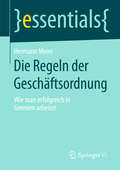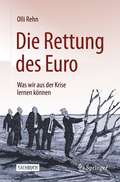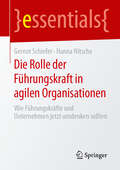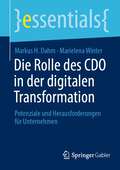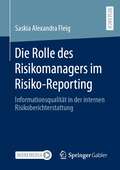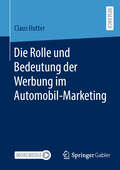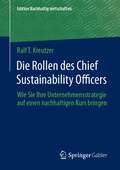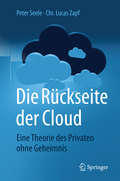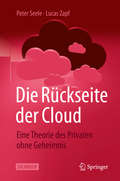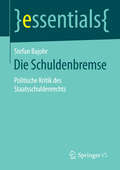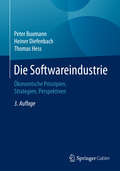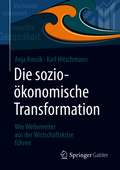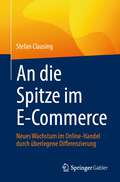- Table View
- List View
Die Rechtsabteilung: Der Syndikus und Steuerberater im Unternehmen
by Tobias LenzRechtsabteilungen in Unternehmen bieten Ein- und Umsteigern aus den rechts- und steuerberatenden Berufen ein attraktives Tätigkeitsfeld. Das Werk erläutert den Weg zum Syndikus sowie den Aufbau einer Rechts- und Steuerabteilung im Unternehmen, gewährt Einblicke in die Rechtsabteilungen bestimmter Branchen und beschreibt deren berufs- und standesrechtliche Hintergründe.Neu in der 3. aktualisierten Auflage: das Spannungsfeld des Loss Adjusters und der Syndikusanwalt im inhabergeführten Mittelstand.
Die rechtssichere Abmahnung: Ein Leitfaden für Personalabteilung und Geschäftsführung
by Pascal Croset Markus DoblerDieses Werk dient als praktische Hilfe für den Alltag von HR-Managern und Personalverantwortlichen. Es zeigt, wie Arbeitgeber eine korrekte Abmahnung verfassen.Der unprofessionelle Umgang mit Abmahnungen als Vorstufe der Kündigung führt häufig zu unschönen Überraschungen im Kündigungsschutzprozess: Oft ist es nicht der Kündigungssachverhalt an sich, der die Kündigung zu Fall bringt, sondern die vorangegangene mangelhafte Abmahnung.Das Werk zeigt, was für eine ordnungsgemäße, formal und inhaltlich wirksame Abmahnung zu beachten ist und verzichtet dabei bewusst auf Anwaltsdeutsch. Eine Checkliste, über 30 Beispiel-Abmahnungen zu verschiedenen Anlässen sowie zahlreiche rechtliche Hinweise runden den Nutzwert des Buches ab. Die 3. Auflage wurde rechtlich auf den aktuellen Stand gebracht und enthält u. a. aktuelle Informationen zum Beteiligungsrecht der Schwerbehindertenvertretung bei Abmahnungen.
Die rechtssichere Abmahnung: Arbeitspsychologisch kommentierter Leitfaden für Personaler und Geschäftsführer
by Pascal Croset Markus DoblerDieses Werk dient als praktische Hilfe für den Alltag von HR-Managern und Personalverantwortlichen. Es zeigt, wie Arbeitgeber eine korrekte Abmahnung verfassen und enthält wertvolle arbeitspsychologische Kommentare/Hinweise.Der unprofessionelle Umgang mit Abmahnungen als Vorstufe der Kündigung führt häufig zu unschönen Überraschungen im Kündigungsschutzprozess: Oft ist es nicht der Kündigungssachverhalt an sich, der die Kündigung zu Fall bringt, sondern die vorangegangene mangelhafte Abmahnung.Das Werk zeigt, was für eine ordnungsgemäße, formal und inhaltlich wirksame Abmahnung zu beachten ist und verzichtet dabei bewusst auf Anwaltsdeutsch. Eine Checkliste, über 30 Beispiel-Abmahnungen zu verschiedenen Anlässen sowie zahlreiche rechtliche Hinweise runden den Nutzwert des Buches ab. Die 4. Auflage wurde rechtlich auf den aktuellen Stand gebracht.
Die rechtssichere Abmahnung: Arbeitspsychologisch kommentierter Leitfaden für Personaler und Geschäftsführer
by Pascal Croset Markus DoblerDieses Werk dient als praktische Hilfe für den Alltag von HR-Managern und Personalverantwortlichen. Es zeigt, wie Arbeitgeber eine korrekte Abmahnung verfassen und enthält wertvolle arbeitspsychologische Kommentare/Hinweise.Der unprofessionelle Umgang mit Abmahnungen als Vorstufe der Kündigung führt häufig zu unschönen Überraschungen im Kündigungsschutzprozess: Oft ist es nicht der Kündigungssachverhalt an sich, der die Kündigung zu Fall bringt, sondern die vorangegangene mangelhafte Abmahnung.Das Werk zeigt, was für eine ordnungsgemäße, formal und inhaltlich wirksame Abmahnung zu beachten ist und verzichtet dabei bewusst auf Anwaltsdeutsch. Eine Checkliste, über 30 Beispiel-Abmahnungen zu verschiedenen Anlässen sowie zahlreiche rechtliche Hinweise runden den Nutzwert des Buches ab. Die 5. Auflage wurde rechtlich auf den aktuellen Stand gebracht.
Die Regeln der Geschäftsordnung: Wie man erfolgreich in Gremien arbeitet (essentials)
by Hermann MeierIn Gremien, Konferenzen und Versammlungen werden Entscheidungen erarbeitet, Beschlüsse gefasst und Repräsentanten gewählt. Anhand der Standard-Tagesordnung eines Vereins wird gezeigt, nach welchen Regeln das korrekt abläuft und worauf man zu achten hat - als Teilnehmer oder als Leiter.
Die resiliente Führungskraft: Sich selbst und andere gesund führen (Fit for Future)
by Wolfgang RothFührung braucht Führungskraft. Doch immer mehr Führungskräften schwindet die Kraft und sie gehen zunehmend in die Erschöpfung, denn die wenigsten Entscheider verfügen über Gesundheitskompetenz. Sie sind Spezialisten auf ihrem Fachgebiet und erhalten ergänzende Schulungen in Projektmanagement, Zeitmanagement und diversen anderen Bereichen. Kompetenzen hinsichtlich "sich selbst und andere gesund zu führen" sind allerdings selten vorhanden. Dieses Buch gibt Anleitungen und Hilfestellungen für Führungskräfte, wie sie ihre eigene Resilienz und Stabilität dauerhaft in einer ausgewogenen Selbstfürsorge gewährleisten können, sowie im Rahmen ihrer Fürsorgepflicht das Wohlergehen ihrer Mitarbeiter*innen im Blick behalten. Zudem vermittelt es essentielles Wissen über ganzheitliche Gesundheit, Salutogenese, Psyche und Resilienz und soll Führungskäften dabei helfen, im Sinne von Prävention und Ressourcenstärkung ihre eigene Selbstwirksamkeit zu fördern und zu erhalten und dadurch den Weg in die Erschöpfung zu vermeiden.
Die Rettung des Euro: Was wir aus der Krise lernen können
by Olli RehnDieses Buch erzählt die Geschichte der Eurokrise aus der Perspektive des damaligen Vize-Präsidenten der Europäischen Kommission. Olli Rehn war als EU-Kommissar für Wirtschaft und Währung einer der wichtigsten Entscheidungsträger zur Zeit der Währungskrise und gibt einen offenen und ungeschönten Einblick in Ereignisse und Entscheidungen in Brüssel, Frankfurt und den EU-Mitgliedsländern sowie in entscheidende Meetings. Seine Analyse reicht vom Start und den ersten Reaktionen auf die Krise 2009-2012 über die Wirkung der Maßnahmen 2013-2014 und schließt mit den zukünftigen Lehren aus der Krise und dem Reformprogramm der Eurozone in 2020. Dieses unterhaltsam und spannend geschriebene Buch richtet sich an Politikerinnen und Politiker, Mitarbeitende und Kommentatoren der Eurozone sowie Studierende, aber auch an alle, die verstehen möchten, wie der Euro tatsächlich gerettet wurde.
Die Rolle der Führungskraft in agilen Organisationen: Wie Führungskräfte und Unternehmen jetzt umdenken sollten (essentials)
by Gernot Schiefer Hanna NitscheIn diesem essential werden Chancen und Hindernisse bei der Umsetzung agiler Personalführung fokussiert und Ansätze dargestellt, Führungskräfte bei dieser zentralen Aufgabe zu unterstützen. Die Autoren skizzieren die Herausforderungen einer Führungskraft, die ihren Mitarbeitern agile Denk- und Arbeitsweisen vorleben soll. Sie arbeiten heraus, wie die Unternehmensspitze und das Personalmanagement dazu beitragen können, dass Führungskräfte dieser Rolle gerecht werden. Nicht zuletzt wird auf die Abhängigkeit der Führungskultur von der Unternehmenskultur aus Sicht der Führungskräfte eingegangen.
Die Rolle der Leadership im Umgang mit Orten des Dark Tourism: Eine Fallstudien-Analyse (Entrepreneurial Management und Standortentwicklung)
by Christian EckertDas Phänomen «Dark Tourism» wird nun seit über einem Vierteljahrhundert wissenschaftlich betrachtet und hält zunehmend auch Einzug in den öffentlichen Diskurs. Vielfach wurden bereits management-bezogene Aspekte bzgl. des Umgangs mit Orten des Dark Tourism beleuchtet; eine Auseinandersetzung mit der Rolle der Leadership erfolgte dabei jedoch bislang nicht. Diese Lücke schließt Christian Eckert mit einer empirischen Studie, welche die Leadership-Prozesse rund um die KZ-Gedenkstätte Dachau, das ehemalige Reichsparteitagsgelände und das Denkmal für die ermordeten Juden Europas näher betrachtet. Experteninterviews mit Akteuren eines breiten gesellschaftlichen Querschnitts bilden dafür die Grundlage. Die Gegenüberstellung der drei Fallstudien zeigt, dass Leadership-Prozesse zwar ein paar wenige Top-Down-Aspekte beinhalten, die für alle relevanten Akteure den grundlegenden Rahmen determinieren. Die eigentlichen Prozesse der Interaktion und des Austauschs sind dann i.d.R. geprägt von Mustern des Bottom-Up-Prinzips.Die Ergebnisse münden in einem Modell der Leadership im Umgang mit Orten des Dark Tourism, welches eine Grundlage für weitere wissenschaftliche Arbeiten in diesem Themenfeld darstellt.
Die Rolle des CDO in der digitalen Transformation: Potenziale und Herausforderungen für Unternehmen (essentials)
by Markus H. Dahm Marielena WinterDieses Buch gibt einen Einblick in die Herausforderungen und Chancen, die mit der Rolle des CDO verbunden sind. Es beschäftigt sich mit Fragen wie: Welche Kompetenzen sollte ein CDO mitbringen? Wie sieht die Zusammenarbeit mit anderen Führungskräften aus? Welche Rolle spielt der CDO in der Unternehmenskultur und wie kann er diese verändern? Zudem wird die Bedeutung des CDO für die digitale Transformation von Unternehmen aufgezeigt. Wie können Unternehmen von einem CDO profitieren und wie können sie den digitalen Wandel erfolgreich gestalten?
Die Rolle des Risikomanagers im Risiko-Reporting: Informationsqualität in der internen Risikoberichterstattung
by Saskia Alexandra FleigIn Anbetracht der aktuellen Krisensituation besitzt die Risikoberichterstattung von Unternehmen weiterhin eine hohe Relevanz. Während bisherige Studien auf extern publizierte Risikoinformationen fokussieren, zeichnet die vorliegende Forschungsarbeit erstmals ein umfassendes Bild über die inhaltliche und prozessuale Ausgestaltung des internen Risiko-Reportings. Im Rahmen einer Feldstudie führte die Autorin dazu Interviews mit Risikomanagern aus 34 bedeutsamen Unternehmen der deutschen Wirtschaft, wodurch neben zumeist vertraulichen Daten auch interne Risikoberichte erhoben werden konnten. Die Ergebnisse der Studie zeigen, dass der Risikomanager eine zentrale Einflussgröße der Berichtsqualität darstellt und dadurch eine besondere Bedeutung im internen Risiko-Reporting-Prozess besitzt. Durch die Wahrnehmung verschiedener Rollen obliegen dem Risikomanager dabei zahlreiche Tätigkeiten, welche unterschiedliche Kompetenzen erfordern. Zudem werden aufgrund einer Vielzahl an Schnittstellen zu Unternehmensakteuren diverse Erwartungen an den Risikomanager gestellt, sodass sich ein umfassendes, komplexes und zum Teil heterogenes Anforderungsprofil ergibt. In Ableitung aus den Ergebnissen der Untersuchung zeichnet die Autorin ein Rollen-, Tätigkeits- und Kompetenzprofil des Risikomanagers sowie seine Einflussmöglichkeiten auf die Informationsqualität in der internen Risikoberichterstattung.
Die Rolle und Bedeutung der Werbung im Automobil-Marketing
by Claus HutterIm Fokus dieser empirisch-medienwissenschaftlichen Studie stehen die Endkunden*innen und Experten*innen aus der Autoindustrie, dem Autohandel und der Kreativwirtschaft im DACH-Raum. Claus Hutter untersucht neben der Rolle und Bedeutung der Automobilwerbung als integrativer Bestandteil des Marketing-Mix auch die interdisziplinären Betrachtungen der Werbepsychologie, Positionierung und deren Einfluss hinsichtlich des Werbeerfolges auf der Kundenreise. Diese umfassende Untersuchung liefert wertvolle Erkenntnisse einerseits für die werblichen Rezeptionsprozesse und Interferenzen von Endkunden und andererseits Handlungsempfehlungen für wirtschaftliche Stakeholder.
Die Rolle von Unternehmen im IFRS-Standardsetzungsprozess: Analyse anhand ausgewählter Regelungen zur Umsatzerfassung aus Mehrkomponentengeschäften nach IFRS 15 (Rechnungswesen und Unternehmensüberwachung)
by Annekatrin JendreckIn diesem Open-Access-Buch würdigt die Autorin unterschiedliche Normermittlungstheorien und betrachtet die Rolle von Unternehmen bei der Entwicklung der Regelungen zur Bilanzierung von Mehrkomponentengeschäften nach IFRS 15. Der IFRS-Standardsetzungsprozess ist durch die Teilnahme unterschiedlicher Interessengruppen gekennzeichnet, die auf die Entstehung von Bilanzierungsregeln Einfluss nehmen. Im Rahmen einer qualitativen Inhaltsanalyse werden die Comment Letter von Unternehmen und die Standardentwürfe zu IFRS 15 auf ihre inhaltliche Zielrichtung sowie die verwendete Rhetorik untersucht und die Auswirkungen auf das Standardsetzungsergebnis veranschaulicht.
Die Rollen des Chief Sustainability Officers: Wie Sie Ihre Unternehmensstrategie auf einen nachhaltigen Kurs bringen (Edition Nachhaltig wirtschaften)
by Ralf T. KreutzerDieses Buch erläutert, wie Chief Sustainability Officer strategische Entscheidungen für Nachhaltigkeit vorbereiten und umsetzen können sowie eine Unternehmenskultur der Nachhaltigkeit fördern. Der Autor zeigt auf, wie CSOs ökologische und soziale Risiken erfolgreich managen und dabei auch die ökonomischen Ziele im Blick haben. Dabei wird ihre Rolle als Treiber von nachhaltigen Innovationen verdeutlicht und erklärt, wie die Kommunikation mit Stakeholdern gestaltet werden sollte, um durch nachhaltiges Agieren einen Wettbewerbsvorteil zu erreichen. Denn Unternehmen sind heute aus gesellschaftlichen, rechtlichen und zunehmend auch wirtschaftlichen Gründen dazu aufgefordert, gleichzeitig eine ökologische, soziale und ökonomische Nachhaltigkeit ihres Handelns sicherzustellen.
Die Rückseite der Cloud
by Peter Seele Chr. Lucas ZapfDas vorliegende Buch entwickelt anhand einer Fülle von Fallstudien eine ideengeschichtliche Typologie von Privatheit und zeigt, in welchen Lebensbereichen Big Data schon Einzug gehalten hat.Die Gedanken sind frei – aber sie sind nicht mehr geheim. Heute sind unsere Daten und Gedanken auf der Rückseite der Cloud gespeichert - wohin wir selbst nicht mehr schauen können. Unsere Informationen sind dem Internet auf ewig anvertraut, werden mit und ohne unser Einverständnis gesammelt. „Privacy is dead“ wie es Mark Zuckerberg formulierte. Aber wie konnte es so weit kommen? Und wenn alle alles wissen: Was ist dann heute noch privat, und gibt es dann überhaupt noch Geheimnisse? Mit einem Nachwort zur Privatheit aus juristischer Sicht von Bertil Cottier
Die Rückseite der Cloud: Eine Theorie des Privaten ohne Geheimnis
by Peter Seele Lucas ZapfDie Gedanken sind frei – aber sie sind nicht mehr geheim. Heute werden unsere Daten von Algorithmen automatisch auf der Rückseite der Cloud gespeichert und ausgewertet – dort, wo wir selbst nicht mehr hinschauen können oder gar Kontrolle über unsere Daten hätten. Unsere privatesten und geheimsten Informationen sind dem Internet auf ewig anvertraut und werden mit und ohne unser Einverständnis permanent gesammelt, gestapelt und verknüpft zu unserem digitalen Zwilling. „Privacy is dead“ wie es Mark Zuckerberg formulierte. Aber wie konnte es so weit kommen? Und wenn alle alles wissen: was ist dann heute noch privat, und gibt es dann überhaupt noch persönliche Geheimnisse, wenn die „Götter“ auf der Rückseite der Cloud uns besser kennen als unsere Freunde und Familie?Die zweite Auflage des Buches entwickelt anhand einer Fülle von aktualisierten sowie gänzlich neuen Fallstudien (Krypto-Währungen, Publizistik oder digitale Spuren sexueller Präferenzen) eine ideengeschichtliche Typologie von Privatheit und zeigt, in welchen Lebensbereichen Big Data und Künstliche Intelligenz schon Einzug gehalten hat.
Die Schlacht um Europas Gasmarkt: Geopolitische, wirtschaftliche und technische Hintergründe
by Oleg Nikiforov Gunter-E. HackemesserEuropa wird zum Spielplatz verschiedener Weltkräfte, die um die Gaslieferungen nach Europa kämpfen. In erster Linie sind die wirtschaftlichen Aspekte dieser Bestrebungen analysiert. Eine wichtige Rolle spielen der Bedarf mit der Berücksichtigung der vorhandenen europäischen Energieprogramme sowie Umwelt- und Klimabeschlüsse, die allgemein verständlich dargelegt sind. Außerdem sind die Regel- und Gasvorräte der Gas anbietenden Lieferanten erklärt. Vor diesem Hintergrund werden auch politische Auseinandersetzungen ausgewertet.
Die Schuldenbremse: Politische Kritik des Staatsschuldenrechts (essentials)
by Stefan BajohrIn diesem Essential geht es um die Entstehungsgeschichte der Schuldenbremse. Der Autor stellt dar, warum die Schuldenbremse das Staatsschuldenrecht verkompliziert und die Parlamente entmündigt. Als das Wirtschaftswachstum in den 1970er Jahren nachließ, stand die Politik vor der Aufgabe, die Erwerbslosigkeit zu bekämpfen und den Sozialstaat zu bewahren. Öffentliche Investitionen, finanziert durch Staatsverschuldung, boten sich als scheinbare Lösung an. Dadurch wuchs ein Schuldenberg von mehr als zwei Billionen Euro heran. Bei etlichen europäischen Nachbarn hat sich die Verschuldung zur Staatsschuldenkrise gesteigert. Die Zinsen engen die Entscheidungsspielräume der Politik ein und verteilen den gesellschaftlichen Reichtum von unten nach oben um. 2009 wurde eine so genannte Schuldenbremse im Grundgesetz verankert. Sie soll von den Euroländern übernommen werden. Damit die Schuldenbremse nicht als Hebel zum Abbau des Sozialstaats dienen kann, braucht es einen leistungsfähigen Staat mit solider Steuerfinanzierung.
Die Schuldenbremse und ihre Umsetzungsqualität in den Ländern: Eine juristisch-ökonomische Analyse
by Julia FischerIn diesem Buch werden die Landesgesetzgebungen der deutschen Bundesländer auf die Qualität der Umsetzung der Schuldenbremse und ihres damit geleisteten Beitrags für solide Länderfinanzen mittels eines explorativen methodischen Ansatzes untersucht. Anhand einer vergleichenden Analyse der Gesetzestexte lassen sich Schwachstellen im juristischen Fundament der Regelungen erkennen und benennen und damit konkrete Handlungsempfehlungen für die Politik ableiten. Damit leistet dieses Buch einen wertvollen Beitrag zum kontextuellen Verständnis der Schuldenbremse, die als fiskalpolitisches Instrument weit mehr als ein bloßes Neuverschuldungsverbot umfasst. Somit trägt diese Untersuchung zum Verständnis der Handlungsintentionen politischer Akteure innerhalb fiskalföderaler Strukturen bei und dient als Beitrag für die Etablierung einer zukunftsfähigen Fiskalpolitik.
Die Selbstanzeige: Ratgeber Steuerstrafrecht
by Thomas Wenzler Markus RübenstahlWer erfolgreich eine Selbstanzeige erstattet, kann nicht bestraft werden, obwohl er eine Steuerhinterziehung begangen hat. Dieser Ratgeber beschreibt die Voraussetzungen und gibt Handlungsempfehlungen. Er wendet sich an Berater, Rechtsanwälte und Steuerberater, die gefordert sind, wenn Mandanten von nicht versteuerten Betriebseinnahmen, nicht deklarierten Geldanlagen und dergleichen berichten. Auch an Richter, Staatsanwälte und Mitarbeiter der Finanzverwaltung richtet sich dieses Buch.Die 3., überarbeitete Auflage betont das Thema Tax Compliance und zeigt verstärkt die Unterschiede zwischen Nacherklärung, § 153 AO, und Selbstanzeige, § 371 AO, nebst Vorzügen der Nacherklärung auf.
Die Selbsterkenntnis der Hochsensibilität: Eine qualitative Studie am Beispiel hochsensibler Menschen im Übergang Schule-Beruf
by Natalie BanekZiel dieses Bandes ist es, unter Anwendung der Grounded Theory Methodologie zu erforschen, wie hochsensible Personen die Transition von der Schule in den Beruf bewältigen. Dazu wurden sowohl Expert*inneninterviews als auch problemzentrierte Interviews mit Betroffenen geführt und in einem systematischen Fallvergleich ausgewertet. Als Ergebnis resultiert die Selbsterkenntnis der Hochsensibilität in Form einer neuentwickelte Grounded Theory, in welcher der Prozess der Selbsterkenntnis der Hochsensibilität als zentrales Schlüsselphänomen ergänzt von 20 weiteren Kategorien zum Erleben hochsensibler Menschen steht, darunter ursächliche und intervenierende Bedingungen, Kontextkategorien und Handlungsstrategien sowie Konsequenzen, welche sich in der Folge ergeben. Damit wird in dem vorliegenden Band zum einen dargelegt, wie hochsensible Menschen ihren Prozess der Selbsterkenntnis erleben und zum anderen wird die Bedeutung dieses Schlüsselmoments im Leben hochsensibler Personen auf die Prozesse der Berufsorientierung und Berufswahl aus berufspädagogischer Perspektive thematisiert.
Die Sharing Economy im Tourismus: Einfluss der Persönlichkeit auf die Nutzung von digitalen Plattformen zur Unterkunftsvermittlung
by Jennifer M. Schietzel-KalkbrennerIm Mittelpunkt der Arbeit steht die Erforschung der Kriterien für die Akzeptanz und Nutzung von digitalen Plattformen zur Vermittlung und (kurzfristigen) Vermietung von privaten Unterkünften, wie sie bspw. auf Airbnb zu finden sind. Da sich Konsumenten immer häufiger für die Nutzung dieser Serviceinnovation entscheiden, wenn sie eine Unterkunft buchen wollen, soll mit dieser Arbeit (touristischen) Unternehmen Einblicke in die Entscheidungsgrundlage der Konsumenten gegeben werden. Die Ergebnisse der Analyse liefern eine Erklärung für den Erfolg von Unternehmen der Sharing Economy mit speziellem Fokus auf den Beherbergungssektor. Dabei werden die Faktoren evaluiert, die zur Akzeptanz derartiger Plattformen beitragen. Zudem wird auch ein besonderer Fokus auf die Persönlichkeitsprofile gelegt, indem die Nutzer dieser Plattformen mit bisherigen Nicht-Nutzern verglichen werden. Diese ergeben zusammengefasst signifikante Unterschiede, die zunächst rein deskriptiv sowohl in soziodemografischer als auch persönlichkeitsbasierter Hinsicht vorzufinden sind. Allerdings ergeben sich auch im Hinblick auf die Akzeptanzgenese signifikante, auf diesen Merkmalen basierende Unterschiede, die speziell für die Ausprägung der Big Five zu im Vorfeld angenommenen Ergebnissen führt (bspw. extravertierte Personen, denen Familiarität besonders wichtig ist).
Die Softwareindustrie
by Heiner Diefenbach Peter Buxmann Thomas HessOb Office-Anwendung, Open-Source-Produkt oder Online-Spiel: Im Hinblick auf ihre ökonomischen Eigenschaften unterscheidet sich Software grundsätzlich von Industriegütern und Dienstleistungen. Ausgehend von den ökonomischen Prinzipien der Softwareindustrie behandelt das Buch Strategien und Geschäftsmodelle für Software- und Serviceanbieter. Neben Kooperations-, Vertriebs-, Preis- und Industrialisierungsstrategien werden Trends wie serviceorientierte Architekturen, Offshoring und Open Source betrachtet. Die Neuauflage wurde vollständig überarbeitet.
Die sozioökonomische Transformation: Wie Wellenreiter aus der Wirtschaftskrise führen
by Anja Kossik Karl HitschmannDer aktuelle sozioökonomische Systemwandel, dessen Auswirkung auf Organisationen und zukunftstaugliche Führungs- und Managementkonzepte Wirtschaftliche Transformationen kommen immer in Wellen, die in der Folge lange Zyklen wirtschaftlichen Wachstums nach sich ziehen. Bisher waren technologische Innovationen Auslöser derartiger Wirtschaftszyklen, so auch bei der letzten Welle, der Digitalisierung. Doch der nächste Wandel ist bereits im Anrollen. Diese neue Welle beruht erstmals nicht auf einer technologischen Neuerung, sondern sie stellt vielmehr den Menschen in seinem sozialen Umgang ins Zentrum: ein sozioökonomischer Systemwandel. Er erfordert von Organisationen und ihren Führungskräften völlig neue Denk- und Handlungsmuster, die in Theorie und praktischen Beispielen aufgezeigt werden.Das Autorenteam beschreibt anhand von praktischen Beispielen und theoretischen Modellen die Symptome, an denen man diesen sogenannten „Systemwandel“ erkennen und festmachen kann. Es wird deutlich, dass die etablierten Handlungs- und Lösungsmuster der Unternehmen für diesen Umbruch überhaupt nicht mehr geeignet sind, obwohl sie weiterhin fast schon reflexartig angewendet werden. Manager und Mitarbeiter brennen nicht nur an der sinnlosen Forderung aus, teilweise Unkontrollierbares sofort „unter Kontrolle“ haben zu müssen, sondern auch an der Angst, dabei zu versagen. Gefangen in vermeintlich sicheren, aber starren und bürokratischen Organisationsstrukturen und -abläufen, reiben sie sich an der Erreichung kurzfristiger Zielvorgaben auf und verlieren dabei die langfristige Wettbewerbsfähigkeit aus dem Auge.Der InhaltPuzzlesteine einer Systemkrise: Symptome in Organisationen und der GesellschaftBlick in die Zukunft: Die Eckpfeiler psychosozial gesunder OrganisationenDer Schritt in die Umsetzung: Anwendungsfelder und hilfreiche KonzepteEin psychosozial gesundes Arbeits- und Führungsverständnis benötigt soziale Fähigkeiten und emotionale Kompetenzen, die in unserem technologisch orientierten Ausbildungssystem bislang zu kurz gekommen sind. Dieses Buch bietet neue, zukunftsorientierte Konzepte und konkrete Orientierungshilfen an, wie Führungskräfte und Entscheidungsträger in Organisationen auf die neue Welle nicht nur rechtzeitig aufspringen, sondern diese auch erfolgreich reiten können. Es soll ein Reiseführer für Menschen sein, die bereits die Zeichen dieser anstehenden Transformation erkennen, die in ihrem Umfeld Veränderungen herbeiführen wollen, aber noch nach dem richtigen Werkzeug dafür suchen.
An die Spitze im E-Commerce: Neues Wachstum im Online-Handel durch überlegene Differenzierung
by Stefan ClausingDieses Buch ist ein wertvoller Leitfaden für Online-Händler, die in einer sich ständig verändernden Branche langfristiges Wachstum erreichen wollen. Stefan Clausing bietet dafür pragmatische Strategien an, ohne dabei zu „fancy“ zu werden. Die Welt des E-Commerce hat in den letzten Jahrzehnten eine rasante Entwicklung erlebt, die durch die SARS-CoV-2-Pandemie ihren vorläufigen Höhepunkt fand. Doch im Jahr 2022 trübte sich die Stimmung ein. Der Online-Handel wurde erstmals mit negativem Wachstum konfrontiert. Jetzt ist es an der Zeit, sich als Online-Shopbetreiber neu aufzustellen. Dieses Buch bietet eine Bestandsaufnahme und zeigt, wie Sie die Chancen nutzen und den Risiken begegnen können.Aus dem InhaltVeränderung ist die Norm: Wie Wachstum im dynamischen Umfeld des E-Commerce gelingt.Positionierung ist der Schlüssel: Vom tiefen Verständnis von Ihrer Zielgruppe zu einer überzeugenden Positionierung.Traffic und Kundenakquise: Kundengewinnung als dauerhafte Herausforderung – Übersicht der wichtigsten Instrumente, um Kunden durch den Kaufentscheidungsprozess zu führen und zu Wiederholungskäufern zu machen.Datenschutz und Marketing: Hand in Hand mit einer klugen Datenstrategie und einer ausgewogenen Budgetierung über den gesamten Conversion Funnel. Customer Relationship Management: Wie Sie anhand des Customer Lifetime Value (CLV) und Kohortenanalysen die Kundenbindung steigern.Ethik im E-Commerce: Wie das Streben nach Gewinnmaximierung nicht auf Kosten des Kundenmehrwerts geht. „An die Spitze im E-Commerce“ bietet eine ganzheitliche Perspektive auf die Herausforderungen und Chancen im digitalen Handel – sowohl für große Online-Shops als auch für KMUs und Selbständige. Die ausgewogenen Ansätze und praktischen Erkenntnisse machen dieses Buch zu einem klugen Ratgeber für Online-Verkäufer, die nachhaltig wachsen und langfristig erfolgreich sein möchten.




